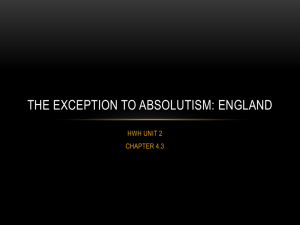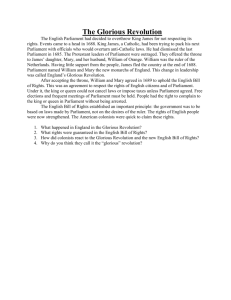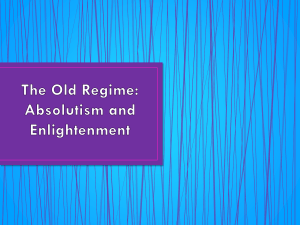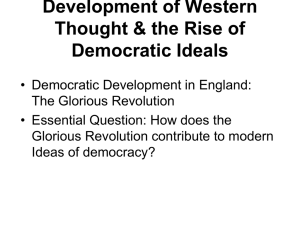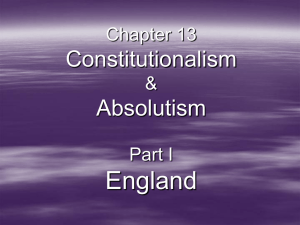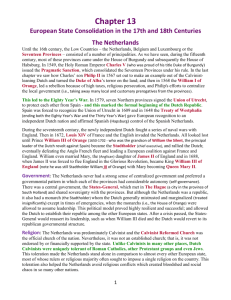England & France
advertisement
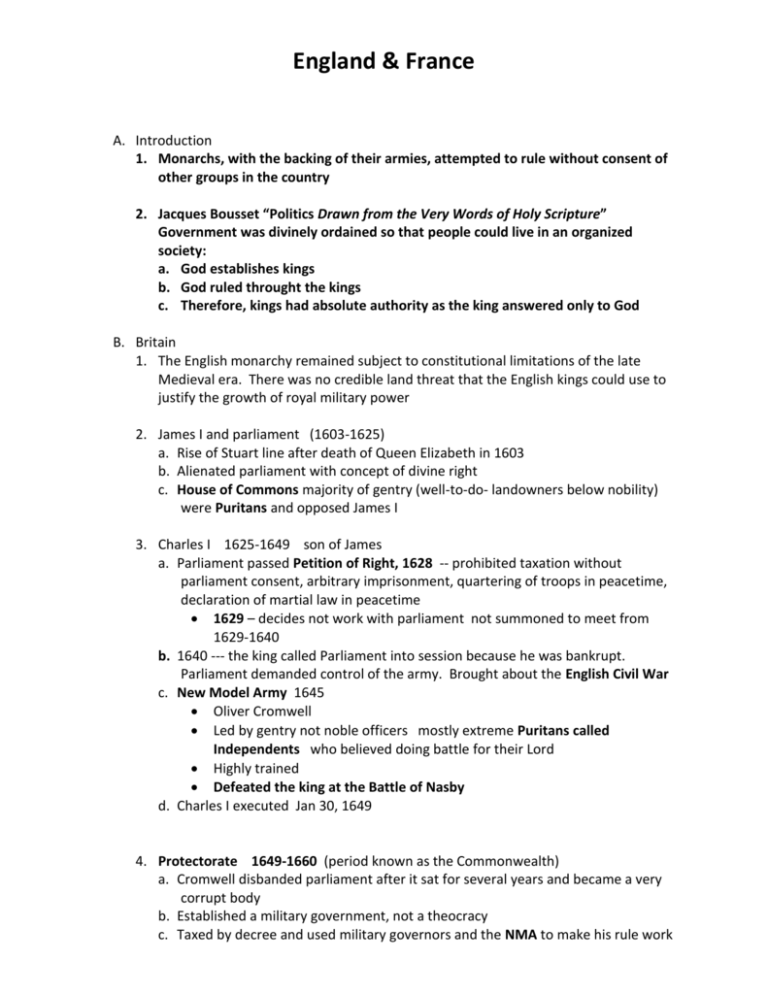
England & France A. Introduction 1. Monarchs, with the backing of their armies, attempted to rule without consent of other groups in the country 2. Jacques Bousset “Politics Drawn from the Very Words of Holy Scripture” Government was divinely ordained so that people could live in an organized society: a. God establishes kings b. God ruled throught the kings c. Therefore, kings had absolute authority as the king answered only to God B. Britain 1. The English monarchy remained subject to constitutional limitations of the late Medieval era. There was no credible land threat that the English kings could use to justify the growth of royal military power 2. James I and parliament (1603-1625) a. Rise of Stuart line after death of Queen Elizabeth in 1603 b. Alienated parliament with concept of divine right c. House of Commons majority of gentry (well-to-do- landowners below nobility) were Puritans and opposed James I 3. Charles I 1625-1649 son of James a. Parliament passed Petition of Right, 1628 -- prohibited taxation without parliament consent, arbitrary imprisonment, quartering of troops in peacetime, declaration of martial law in peacetime 1629 – decides not work with parliament not summoned to meet from 1629-1640 b. 1640 --- the king called Parliament into session because he was bankrupt. Parliament demanded control of the army. Brought about the English Civil War c. New Model Army 1645 Oliver Cromwell Led by gentry not noble officers mostly extreme Puritans called Independents who believed doing battle for their Lord Highly trained Defeated the king at the Battle of Nasby d. Charles I executed Jan 30, 1649 4. Protectorate 1649-1660 (period known as the Commonwealth) a. Cromwell disbanded parliament after it sat for several years and became a very corrupt body b. Established a military government, not a theocracy c. Taxed by decree and used military governors and the NMA to make his rule work 5. Restoration of Charles II 1660-1685 a. Charles II had been living in Holland, Parliament asked him to return b. Wanted to rule like his cousin: Louis XIV c. enjoyed the life of a 17th century monarch 6. a. b. c. d. e. f. g. Glorious Revolution 1688 *** challenges divine right of monarchs Parliament became convinced, with some justification, that Charles and his brother James were training an army to be used to restore Roman Catholicism to England Parliament passed the Test Act in 1674. This act required all government office holders, military, and civil, to sign a test oath stating they were not Catholic. James refused to sign. Charles ordered Mary, daughter of James to marry William Price of Orange, a protestant monarch from Holland --- Nov. 4, 1677. Then had Anne, his younger niece marry George Prince of Denmark (Catholic) Charles died Feb. 6, 1685, James became James II 1685-1688 Battle of Sedgemoor, July 6, 1685, James defeated a rebel army. 1200 men beheaded and their heads were placed on poles all over the country. Thousands more, many not even in the rebel force, were sold into indentured servitude in British colonies in the New World He dismissed Parliament Nov. 20, 1685 h. Declaration of Indulgence April 1688 Suspended all laws restricting Catholics & dissenters from office i. June 10, 1688, James second wife gave birth to a son, who became the next in line to the British throne, he was a Catholic (his daughters were Protestant) j. Parliament asked William to come from Holland and rule England. Nov. 1688, James fled into exile 7. Wiliam & Mary to throne by parliament 1688 a. English Bill of Rights 1689 1. Affirmed Parliaments right to make laws, levy taxes, & armies raised only with consent of Parliament 2. Did not settle religious issues in England (monarch must be Anglican) 8. Results: Parliament’s power supreme a. Royal powers curbed b. Inalienable rights established c. It legitimized the Glorious Revolution During this time two major works written: Leviathan by Thomas Hobbes and Two Treatises of Government by John Locke C. France 1. Initially they had the ancient regime a. King dominated by the nobility but confirmed by God b. Concerned with international issues c. Nobility with local and regional issues 2. Three estates a. First: clergy --- 1% of population, no taxes, owned 10% of the land b. Second: nobility --- 2% of population, few taxes, owned 82% of land, 1. Army officers from this estate 2. c. Third: everyone else 97% of population, most of the taxes, owned 8% of the land Bourgeois --- city dwelling middle class Laborers and artisans Peasants 3. Louis XIII 1610-1643 a. He was too young to run the government. Wife, Maria de Medici told Estates General (1614) to go home. It did not reassemble until 1787 b. 1624 --- Louis gained control of the government through an uprising; banished his wife & all her foreign supporters c. Cardinal Richelieu 1. Prime minister of France 1624-1642 2. Increased the power of the national government at the expense of the nobility and the Huguenots. He destroyed hundreds of castles, forts, and city walls during the 1630 4. a. b. c. d. e. f. Louis XIV 1643-1715 Sun King 4 years old when he came to the throne His mother, Anne of Austria was the regent and she relied on Cardinal Mazarin, who had been trained by Richelieu Fronde 1648 1. Nobles of the Robe – post medieval nobility most from service to the king 2. Last serious challenge by the provincial estates and the nobility to the centralizing actions of the crown: absolutist monarch 3. Wanted the intendant system dismantled 4. Failed because it could not muster a force to challenge the army Second Fronde 1650 1. Nobles of the Sword remnants of medieval era military families 2. Failed because they began to fight for themselves Forced the nobility to live at Versailles Edict of Fontainebleau 1685 1. Believed in motto “one king, one law, one faith” 2. Revoked the Edict of Nantes 3. Destroyed Huguenot churches 4. 200,000 Huguenots forced to flee to England or Holland 5. Colbert: Minister of Finance a. Modernized the tax collection system b. Reformed one industry per year c. Mercantilism -- government regulation of economic activities to benefit the state 1. Created merchant marine 2. Decreased imports by raising tariffs ( English & Dutch cloth) 3. Roads & canals built to improve distribution of goods 6. Wars of Louis XIV a. To achieve prestige and military glory plus to ensure domination of his Bourbon dynasty --- four wars over period from 1667-1713 b. Led to financial crisis in France and enemies on the borders

